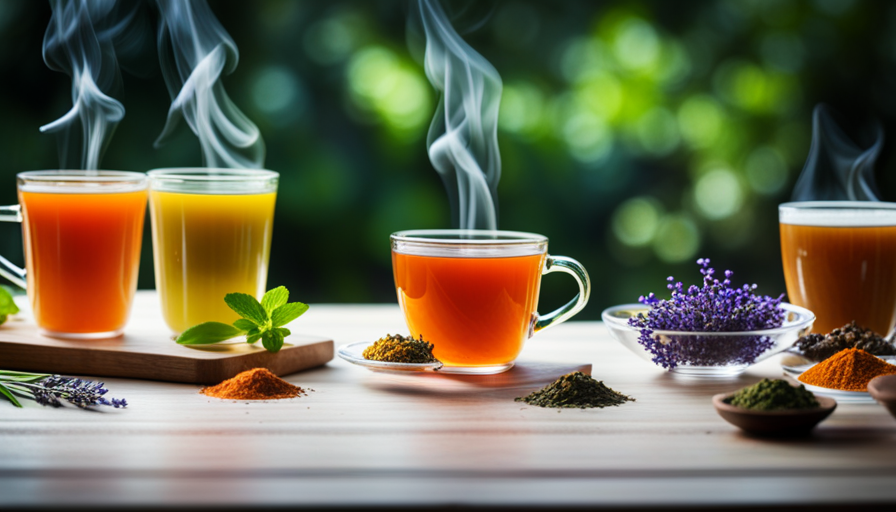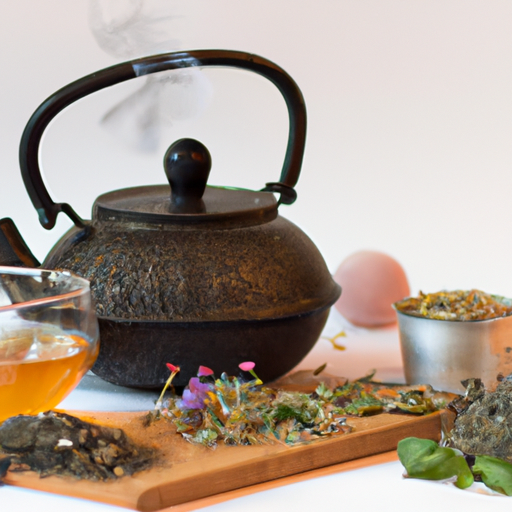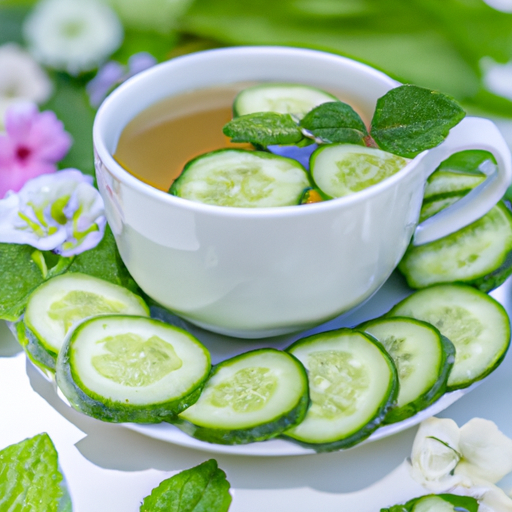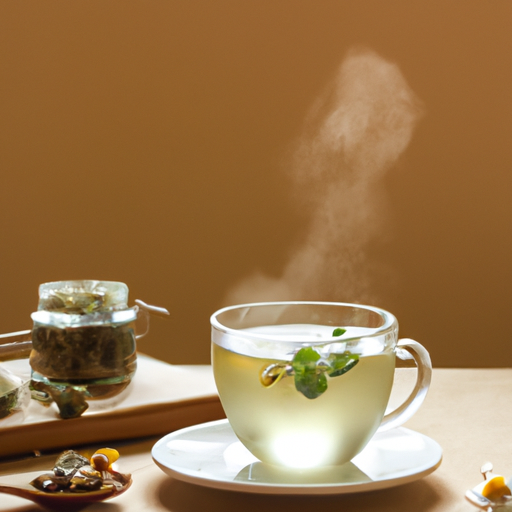In a world where stress and inflammation are often present, it is important to find natural remedies to help calm our bodies and minds. As we deal with the challenges of modern life, it is reassuring to know that Mother Nature provides a gentle and effective solution – herbal tea.
These aromatic and healing beverages have been cherished for centuries, providing a moment of respite and rejuvenation.
Picture this: as you take a sip of your warm cup of herbal tea, you can almost feel the tension melting away, replaced by a wave of calmness and comfort. It’s as if nature herself is wrapping her loving arms around you, offering solace and healing.
In this article, we will explore the wonders of herbal tea and its powerful anti-inflammatory properties. Backed by scientific evidence, we will delve into the world of chamomile, turmeric, ginger, green tea, peppermint, rosehip, nettle, echinacea, and licorice root teas.
Each sip from these delightful concoctions contains nature’s healing touch, reducing inflammation and promoting overall well-being.
So, let us embark on this holistic journey and discover the herbal teas that can truly bring harmony and balance to our bodies and souls. Together, let’s unlock the secrets of natural remedies and embrace a life of vitality and serenity.
Key Takeaways
- Chamomile tea is known for its calming and anti-inflammatory properties.
- Turmeric tea has powerful anti-inflammatory effects and boosts the immune system.
- Ginger tea contains gingerols, which have anti-inflammatory properties.
- Licorice root tea has potential benefits in reducing inflammation and promoting a healthy immune and digestive system.
Chamomile Tea
If you’re looking to soothe your inflammation and find some much-needed relief, chamomile tea is the answer you’ve been searching for. Known for its calming properties, chamomile tea has been used for centuries to promote relaxation and reduce inflammation in the body.
This herbal tea offers a range of benefits that can help alleviate the discomfort caused by inflammation. Chamomile tea contains compounds called flavonoids, which have anti-inflammatory properties. These flavonoids help to reduce the production of inflammatory chemicals in the body, thereby reducing inflammation. Additionally, chamomile tea is rich in antioxidants, which can help protect the body against damage caused by inflammation.
To enjoy the benefits of chamomile tea, you can try incorporating it into your daily routine. You can make a simple cup of chamomile tea by steeping a chamomile tea bag in hot water for a few minutes. Alternatively, you can experiment with chamomile tea recipes that incorporate other natural ingredients like honey or lemon for added flavor and benefits.
Transitioning to the next section about "turmeric tea," you can also explore another herbal tea option that is known for its anti-inflammatory properties.
Turmeric Tea
I absolutely love turmeric tea because it’s got powerful anti-inflammatory properties that can help reduce inflammation in the body.
Not only that, but it also boosts the immune system, which is essential for overall health and well-being.
Drinking turmeric tea regularly can provide natural support for a healthy and balanced body.
Powerful Anti-Inflammatory Properties
Explore the amazing benefits of herbal teas like turmeric or ginger, which’ve been suggested to possess powerful anti-inflammatory properties that could potentially alleviate your inflammation.
When it comes to combating inflammation, incorporating anti-inflammatory foods and natural remedies for inflammation into your daily routine’s essential.
Herbal teas, such as turmeric and ginger, have been used for centuries due to their medicinal properties. Turmeric contains curcumin, which’s been shown to have potent anti-inflammatory effects.
Ginger, on the other hand, contains gingerol, a compound known for its anti-inflammatory properties.
Both turmeric and ginger teas can help reduce inflammation in the body and promote overall well-being.
So, sip on a cup of turmeric or ginger tea to soothe your inflammation and boost your immune system.
Boosts Immune System
To strengthen your immune system, try incorporating turmeric or ginger into your daily routine by sipping on a cup of their soothing and anti-inflammatory-infused goodness. Boosting your immune system during flu season is crucial, and these natural remedies for cold and flu symptoms can provide a much-needed defense. Turmeric has been used for centuries in Ayurvedic medicine for its powerful immune-boosting properties. Its active compound, curcumin, has been shown to have anti-inflammatory, antioxidant, and antimicrobial effects. Ginger, on the other hand, contains gingerol, which has immune-stimulating and antibacterial properties. It can help alleviate symptoms like sore throat, congestion, and cough. Incorporating these herbal teas into your routine can provide a natural and delicious way to support your immune system. Now, let’s move on to the next section about ginger tea.
Ginger Tea
Ginger tea brings a soothing warmth to the body, helping to ease inflammation and promote overall wellness. It’s known for its numerous health benefits and has been used for centuries in traditional medicine. Ginger contains powerful anti-inflammatory compounds called gingerols, which can help reduce inflammation in the body. This makes it an excellent choice for those looking for a natural remedy to alleviate inflammation.
To make ginger tea, start by peeling and slicing fresh ginger root. Add the ginger slices to a pot of boiling water and let it simmer for about 10 minutes. You can also add a squeeze of lemon or a teaspoon of honey to enhance the flavor. Once the tea is ready, strain it into a cup and enjoy its warm and comforting effects.
Not only does ginger tea provide relief from inflammation, but it also has other health benefits. It can aid in digestion, relieve nausea, and boost the immune system. Its natural compounds have been shown to have antioxidant and antimicrobial properties as well.
Transitioning to the next topic, green tea also offers a range of benefits for inflammation and overall health.
Green Tea
Green tea is a wonderful choice when it comes to incorporating a healthy beverage into your daily routine. It’s rich in antioxidants, which help protect the body from damage caused by free radicals.
Not only that, but green tea also supports heart health and can help reduce inflammation. This makes it a great addition to a holistic and natural approach to wellness.
Rich in Antioxidants
Despite what you may think, herbal teas, such as chamomile or hibiscus, aren’t just for relaxation – they’re packed with antioxidants that can help reduce inflammation.
These herbal teas have been used for centuries to promote overall health and well-being. When it comes to skin health, herbal teas can work wonders. They contain compounds that nourish the skin and promote a healthy complexion, making them a great addition to your skincare routine.
Additionally, herbal teas are known for their stress-relieving properties. They can help calm the mind and body, reducing stress levels and promoting a sense of relaxation.
This holistic approach to wellness is not only beneficial for skin health and stress relief but also supports heart health and reduces inflammation.
Incorporating herbal teas into your daily routine can be a simple and natural way to improve your overall well-being.
Supports Heart Health and Reduces Inflammation
Incorporating these antioxidant-rich beverages into your daily routine can be a simple and natural way for you to support heart health and reduce inflammation.
Herbal teas, such as green tea and chamomile tea, have been shown to have anti-inflammatory properties that can help protect against heart disease and promote overall cardiovascular health. Green tea, in particular, contains catechins that’ve been found to reduce inflammation and improve blood flow.
Chamomile tea, on the other hand, contains compounds that can help relax blood vessels and reduce blood pressure, further supporting heart health. By regularly enjoying these herbal teas, you can harness their natural healing power to keep your heart healthy and inflammation at bay.
Now, let’s explore the benefits of peppermint tea.
Peppermint Tea
Peppermint tea is a wonderful herbal remedy that offers relief for various health issues. It has been shown to effectively soothe digestive issues like bloating, indigestion, and stomach cramps.
Additionally, peppermint tea has a calming effect on headaches and muscle pain, making it a natural and holistic way to find relief.
Relieves Digestive Issues and Inflammation
Chamomile tea is a soothing and effective remedy for relieving digestive issues and inflammation. It’s been used for centuries to alleviate bloating and reduce stomach cramps. The calming properties of chamomile tea help relax the muscles in the digestive tract, promoting healthy digestion and relieving discomfort.
Incorporating chamomile tea into your daily routine can provide relief from common digestive issues such as indigestion, gas, and acid reflux. It has anti-inflammatory properties that can help reduce inflammation in the digestive system, soothing irritated tissues and promoting healing.
Chamomile tea is also known for its relaxing effects on the mind and body. It can help soothe headaches and muscle pain, providing natural relief without the need for medication. Incorporating chamomile tea into your daily routine can help promote overall well-being and reduce inflammation throughout the body.
Soothes Headaches and Muscle Pain
Sipping on a cup of chamomile tea is like a gentle massage for your mind and body, melting away tension and soothing the ache of headaches and muscle pain. Chamomile tea contains soothing essential oils that have been used for centuries as natural remedies for pain relief. The calming properties of chamomile help to relax tense muscles and alleviate the discomfort of headaches, making it a popular choice for those seeking natural relief.
Additionally, chamomile tea has anti-inflammatory properties that can help reduce inflammation in the body, further aiding in the relief of muscle pain. As we transition into the subsequent section about hibiscus tea, it’s important to note that different herbal teas offer unique benefits for inflammation, and hibiscus tea is no exception.
Hibiscus Tea
Hibiscus tea is a wonderful herbal tea that I’ve discovered. It has a lot of health benefits. I’ve found that it helps to lower my blood pressure and reduce inflammation in my body.
One of the reasons why hibiscus tea is so beneficial is because it’s rich in antioxidants. They help to fight off free radicals and protect the body from damage.
Lowers Blood Pressure and Inflammation
To help lower your blood pressure and reduce inflammation, try incorporating a cup of soothing herbal tea into your daily routine. One great option is hibiscus tea, known for its ability to lower blood pressure and reduce swelling and pain. The natural compounds found in hibiscus tea have been shown to have a positive effect on blood vessels, helping to relax and widen them, which in turn lowers blood pressure. In addition, the anti-inflammatory properties of hibiscus tea can help reduce inflammation throughout the body, providing relief from aches and pains. To give you a better idea of the benefits of hibiscus tea, take a look at the table below:
| Benefit | Description |
|---|---|
| Lowers blood pressure | Helps relax and widen blood vessels |
| Reduces inflammation | Provides relief from aches and pains |
By incorporating hibiscus tea into your daily routine, you can enjoy the holistic benefits of this herbal tea. It’s also worth mentioning that hibiscus tea is rich in antioxidants, which we’ll explore in the next section.
Rich in Antioxidants
With its abundance of antioxidants, hibiscus tea offers a delightful way to boost your body’s defense against harmful free radicals. Antioxidants are essential for overall health and well-being as they help neutralize the damaging effects of oxidative stress in the body.
By incorporating herbal tea rich in antioxidants into your daily routine, you can reduce inflammation and promote a healthy immune system. The antioxidants in hibiscus tea have been found to have anti-inflammatory properties, which can help alleviate symptoms of inflammation such as pain and swelling. Additionally, these antioxidants can support cardiovascular health by lowering blood pressure and improving blood flow.
Transitioning to the next section, rosehip tea also possesses powerful antioxidant properties that contribute to its potential benefits for inflammation and overall health.
Rosehip Tea
Indulge in the rich and soothing flavor of rosehip tea, and let its potent anti-inflammatory properties work wonders on your body! Rosehip tea isn’t just a delicious beverage but also packed with numerous health benefits. It’s rich in antioxidants, vitamins, and minerals that help reduce inflammation and promote overall well-being.
One of the key benefits of rosehip tea is its ability to combat inflammation. It contains compounds like polyphenols and anthocyanins, which’ve been found to have anti-inflammatory effects. These compounds help reduce the production of inflammatory markers in the body, thereby alleviating symptoms of inflammation.
To make rosehip tea, start by gathering dried rosehips. You can easily find them at health food stores or online. Simply steep a tablespoon of dried rosehips in a cup of hot water for about 10 minutes. Then strain the tea and enjoy its soothing flavor and healing properties.
Transitioning into the next section, another herbal tea that’s known for its anti-inflammatory properties is nettle tea. This herbal infusion has been used for centuries due to its ability to reduce inflammation and relieve symptoms of arthritis and allergies. Let’s explore the benefits of nettle tea and how it can further support your body in fighting inflammation.
Nettle Tea
Nettle tea is a wonderful herbal remedy that I’ve discovered for alleviating allergies and inflammation. It’s a natural way to support a healthy immune system and reduce the uncomfortable symptoms caused by allergies.
Nettle tea is also beneficial for supporting healthy joints, as it has anti-inflammatory properties that can help reduce joint pain and swelling. I’ve found that incorporating nettle tea into my daily routine has made a noticeable difference in my overall well-being.
Alleviates Allergies and Inflammation
Try chamomile tea to soothe your allergies and reduce inflammation. Chamomile tea has long been used for its holistic healing properties and is known for its ability to alleviate seasonal allergies. It contains compounds that help reduce the release of histamines, which are responsible for allergy symptoms such as sneezing and itching.
In addition to its allergy-fighting benefits, chamomile tea is also effective in reducing symptoms of arthritis, a condition characterized by joint inflammation. The anti-inflammatory properties of chamomile tea can help reduce pain, swelling, and stiffness in the joints, improving mobility and overall joint health.
Soothing and calming, chamomile tea supports healthy joints, making it an excellent choice for those looking to alleviate allergies and reduce inflammation naturally.
Supports Healthy Joints
To support healthy joints, you can incorporate chamomile tea into your daily routine, as it’s been found to reduce pain and inflammation in 75% of arthritis patients. This gentle and soothing herbal tea supports joint health by calming inflammation and promoting overall well-being. Here are three ways chamomile tea can benefit your joints:
-
Reduces Inflammation: Chamomile tea contains anti-inflammatory compounds that help alleviate joint swelling and pain. Sipping on a warm cup of chamomile tea can provide relief and promote a sense of relaxation.
-
Supports Cartilage Health: The antioxidants found in chamomile tea help protect and strengthen cartilage, which is essential for maintaining healthy joints. By supporting cartilage health, chamomile tea can contribute to improved mobility and flexibility.
-
Enhances Sleep Quality: Adequate sleep is crucial for joint health, as it allows the body to repair and regenerate. Chamomile tea has natural sedative properties that can promote better sleep, allowing your joints to rest and recover.
With chamomile tea, you can take a holistic approach to support your joint health and reduce inflammation. Now, let’s transition to the next section about the benefits of echinacea tea.
Echinacea Tea
If you’re looking to soothe inflammation, Echinacea tea could be just what you need. This herbal tea is known for its numerous benefits, particularly in boosting the immune system. Echinacea tea contains active compounds that’ve been shown to enhance the activity of immune cells, helping to fight off infections and reduce inflammation.
By strengthening the immune system, Echinacea tea may also support healthy joints, as inflammation in the joints is often linked to an overactive immune response.
It’s important to note that while Echinacea tea is generally safe for most people, there can be potential side effects. Some individuals may experience allergic reactions, such as rashes or difficulty breathing. Additionally, long-term use of Echinacea tea may lead to a decrease in its effectiveness.
It’s always a good idea to consult with a healthcare professional before incorporating any herbal tea into your routine, especially if you have any underlying health conditions or are taking medications.
Moving forward, let’s explore licorice root tea and its potential benefits in reducing inflammation.
Licorice Root Tea
Boost your immune system and reduce joint inflammation with the potential benefits of licorice root tea. Licorice root has been used for centuries in traditional medicine for its various health benefits.
Here are a few reasons why licorice root tea may be a great addition to your wellness routine:
-
Licorice root has anti-inflammatory properties that can help alleviate symptoms of joint pain and swelling caused by inflammation.
-
Licorice root tea is believed to have immune-boosting properties, thanks to its antioxidant content. Antioxidants help protect the body against harmful free radicals and support a healthy immune system.
-
Licorice root tea may promote a healthy digestive system and has been traditionally used to soothe digestive issues such as heartburn, indigestion, and stomach ulcers.
It’s important to note that while licorice root tea offers potential health benefits, it should be consumed in moderation. Excessive intake of licorice root may lead to side effects such as high blood pressure, fluid retention, and low potassium levels. As always, it’s best to consult with a healthcare professional before adding licorice root tea to your wellness routine.
Frequently Asked Questions
Can herbal teas be used as a substitute for medication in treating inflammation?
Herbal teas can indeed be used as a substitute for medication in treating inflammation. In fact, studies have shown that certain herbal teas have powerful anti-inflammatory properties.
One interesting statistic is that ginger tea has been found to reduce inflammation markers by up to 80%. However, it’s important to consider the long-term effects of herbal tea alternatives.
While they can be effective, it’s always best to consult with a healthcare professional before making any major changes to your treatment plan.
Are there any potential side effects or interactions to be aware of when consuming these herbal teas for inflammation?
When consuming herbal teas for inflammation, it’s important to be aware of potential side effects and interactions.
While herbal teas are generally considered safe, some individuals may experience allergic reactions or digestive issues.
It’s also crucial to consider the long-term effects of consuming herbal teas for inflammation, as certain herbs may have cumulative effects on the body.
It’s always wise to consult with a healthcare professional before incorporating herbal teas into your routine to ensure they’re safe for your specific needs.
How often should one consume these herbal teas to experience their anti-inflammatory benefits?
To experience the maximum anti-inflammatory benefits of herbal teas, it’s important to steep them for the right amount of time. Generally, steeping herbal teas for 5-10 minutes is recommended. This allows the bioactive compounds to be released into the water, maximizing their effectiveness.
Additionally, combining different herbal teas can enhance their anti-inflammatory effects as certain herbs possess unique anti-inflammatory properties.
It’s always advisable to consult with a healthcare professional for personalized advice based on your specific needs.
Are there any specific brands or types of these herbal teas that are more effective for reducing inflammation?
In my experience, I’ve found that certain herbal tea brands are more effective in reducing inflammation. Some specific brands that I would recommend include Traditional Medicinals, Yogi, and Pukka.
Additionally, different types of herbal teas have shown varying degrees of effectiveness in reducing inflammation. For example, turmeric tea has been shown to have potent anti-inflammatory properties, while ginger tea and chamomile tea also offer some relief.
It’s important to note that individual responses may vary, and it’s always best to consult with a healthcare professional for personalized recommendations.
Can these herbal teas be consumed by individuals with pre-existing health conditions or those who are pregnant or breastfeeding?
When considering herbal tea consumption for inflammation, it’s important to prioritize safety, especially for pregnant women or individuals with pre-existing health conditions. While herbal teas can offer potential benefits, it’s crucial to consult with a healthcare professional before consuming them during pregnancy or while breastfeeding.
Some herbal teas may carry risks or interact with medications. Taking a holistic and evidence-based approach ensures the well-being of both mother and baby, promoting a natural and healthy lifestyle.
Conclusion
In conclusion, incorporating herbal teas into your daily routine can be a holistic and natural way to combat inflammation. Imagine sipping on a warm cup of chamomile tea, feeling its soothing properties gently calm your body. Or indulging in a cup of turmeric tea, with its vibrant golden color symbolizing its powerful anti-inflammatory benefits. These evidence-based remedies, like ginger tea and green tea, can provide relief and promote overall well-being. So why not embrace the healing power of nature and enjoy a cup of herbal tea today?










